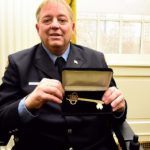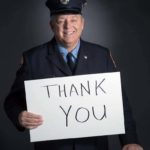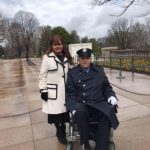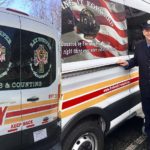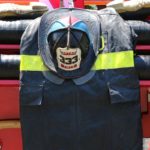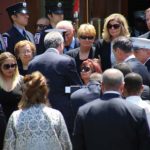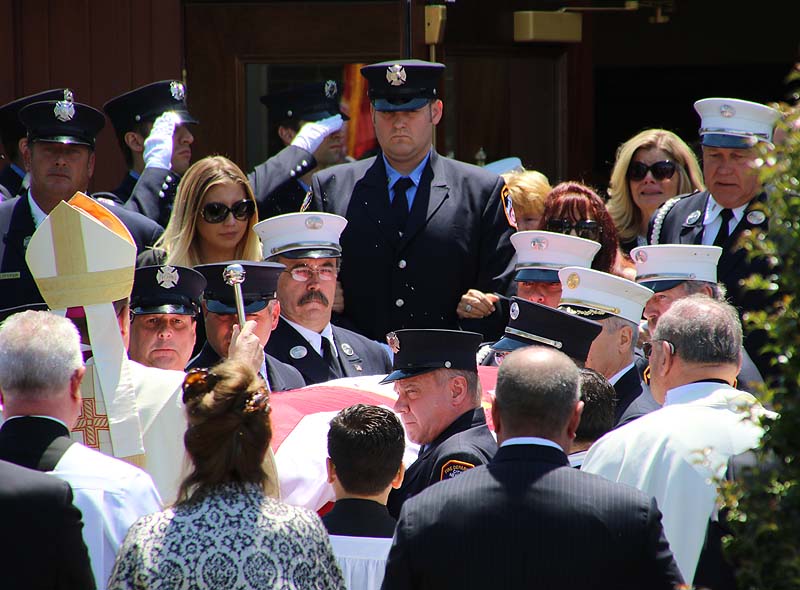
In one of his last phone calls from the Port Washington hospice where he lived out his final days, Ray Pfeifer of Hicksville dialed Jon Stewart’s cell phone. The retired NYC firefighter had one final request for the comedian: deliver the eulogy at his funeral.
And so it was that on the first Friday in June, at the Holy Family Church in Hicksville, Stewart stood at the lectern and moved and entertained those mourning Pfeifer, 59, who died from 9/11-related cancers on Sunday, May 28. Pfeifer had spent many months at Ground Zero, which we now know was toxic, and has claimed more victims with each passing year.
Pfeifer and the comic had partnered to successfully get an extension of the James Zadroga 9/11 Health and Compensation Act past a recalcitrant U.S. Senate in 2015. The act funds medical treatment for responders and survivors who have and will experience 9/11 health complications. It had passed in 2010 and signed into law by President Obama in 2011, but it had sunset provisions. Stewart, through his Daily Show, was given credit for helping to pass the original law when it stalled in Congress.
Stewart detailed how Pfeifer, in failing health and getting around in a motorized wheelchair, persuaded reluctant politicians to extend the legislation.
“Because it wasn’t about him,” Stewart pointed out. “It was about service to others. Always do the right thing.”
“I remember how at the end of our lobbying efforts I felt beaten and disgusted by what I had witnessed,” Stewart related. “All I was getting [from senators or aides] was business cards. And I said to Ray, ‘If I get another business card, I’m going to scream.’ And Ray said, ‘I’m OK.’ And I said, ‘How, Ray? How do you maintain your cool in all of this?’ He patted his chest. And he reached in and pulled out prayer cards (from 9/11 firefighters’ funerals). Hundreds of them. He said, ‘I got all the cards I need.’ ”
Here, Stewart’s voice broke as he concluded, “And now, Raymond, I got one (pulling out Pfeifer’s Mass card). And it’s going to teach me how to do right. Thank you.”
NYC Mayor Bill DiBlasio and Fire Commissioner Daniel Nigro were among those who joined Pfeifer’s widow Caryn, son Terence and daughter Taylor, sisters Maryellen, Noreen, Patricia and Kathleen, and brothers Joseph and Daniel.
Words of Remembrance were given by Pfeifer’s sister, Maryellen McKee, who noted, “Those who knew Ray well knew he was a pain in the neck—been that way all his life. And yet look around. Look at all of us here. We’re here to celebrate a man who would have done anything to help anyone.”
Former NYC Fire Commissioner Sal Cassano said that Pfeifer spent countless hours at the site, and “when he wasn’t at the site, he was helping take care of the families of the members of the firehouse, Engine 40-Ladder 35. He made sure their holiday season was a little better than it could be,” Cassano said.
“When we found out that Ray was stricken with cancer, we were all devastated,” said Cassano. “He was larger than life. The go-to guy. How could this happen with him? Well, Ray handled illness with courage I’d never seen before, much better than we could have. He was always upbeat, and after you talked to him, you were in a better place.”
Cassano noted, “He liked to call himself the ‘Poster Boy’ [for the 9/11 illness movement]. I liked to call him the ‘Ambassador.’ He did what was needed to be done, whether being a bulldog and chase after some elected official—which was a funny site to see—or be a big teddy bear, with that infectious smile to win over some [official].”
“Today, the FDNY family is hurting, the East Meadow Fire Department family is hurting, the entire firefighting community is hurting at Ray’s loss,” Cassano concluded. “Rest in peace, Ray. Your legacy lives on forever.”
For his efforts in aiding fellow 9/11 survivors, Pfeifer was awarded the “Key” to NYC in 2016.
“I can’t think of anyone who deserves it more than Ray Pfeifer,” Mayor DiBlasio said at the Jan. 9 ceremony. “The key to the city was made for people like Ray Pfeifer.”
DiBlasio went on to note, “People asked him why he stayed [at Ground Zero]. His answer was painful but simple—to find his friends. And that determination, that single-mindedness, that was inspiring. It was inspiring to everyone around him and it was a reminder of what commitment looks like and you can see it in the months and years after, as he fought cancer, and you could see it in the halls of Washington. There is a famous saying about Ray, that he walked 140 miles through the halls of Congress—that’s how relentless he was. It didn’t matter if he was in pain, it didn’t matter if it was a difficult task, it was something he felt he had to do for an entire generation of first responders and survivors.”
Pfeifer got good news before he died: His son Terrence, who joined the FDNY as an EMT in 2015, had scored high on the latest FDNY exam and was slated to join the FDNY Academy’s next class of recruits.
His daughter Taylor is slated to join the Suffolk County Police Department.
Day of Infamy
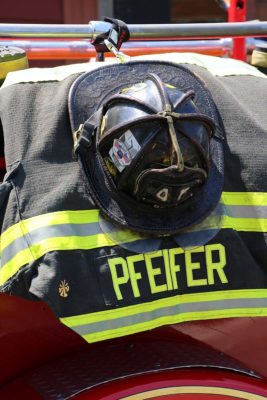
On Sept. 11, 2001, Pfeifer, who joined the FDNY in 1987, was playing a round of golf with fellow firefighters on his day off. When word came that a plane had slammed into one of the towers of the World Trade Center, Pfeifer and the others rushed to the WTC. He was a member of Engine 40-Ladder 35, near Lincoln Center. According to sources, the firehouse lost 12 members at the WTC that day. Pfeifer himself reportedly barely escaped the collapse that afternoon of World Trade Center 7.
Pfeifer spent eight months at Ground Zero, searching for remains. He often slept in a firetruck or at the firehouse. This devotion ultimately cost him his life.
He first developed what was called “9/11 cough,” and in 2009, doctors discovered that a “baseball-sized” tumor had broken his hip and he was diagnosed with Stage IV renal cancer. He had surgery to remove his hip and part of the femur and soon after had one kidney removed. In subsequent years, the cancer spread, and in May 2014, chemotherapy treatments had so weakened his heart that he suffered a heart attack.
The Centers for Disease Control and Prevention (CDC) reported that the most common certified cancers suffered by people in the World Trade Center Health Program were non-melanoma skin cancer, non-Hodgkin’s lymphoma, melanoma and thyroid cancers. Before cancers were added to the list of certified ailments in September 2012, Pfeifer had to go into debt because of the enormous uncovered medical expenses. For him and thousands of others, extending the Zadroga Act was a crucial event. According to one report, 127 NYC firefighters have died of 9/11-related respiratory illnesses and cancers.
The CDC website lists among the top 10 certified conditions reported by WTC first responders as respiratory illnesses (6,627) and cancers (5,618).
After being assigned to desk duty, Pfeifer finally retired from the FDNY in September 2014.
“I’m being poisoned, and I’m dying, every single day, because of terrorism,” Pfeifer told an interviewer in 2014. But he added, “I’m a very lucky man. My friends were murdered on 9/11, From that day on, I’m still here. I’m very lucky. I got to watch my kids grow up.”
He had, he once said, spent “27 years, 220 days and nine hours” as a member of “The Bravest.”
“Ray Pfeifer was a true fighter who bravely battled fires as a New York City firefighter and fought tirelessly for all first responders who—like him—suffered from World Trade Center-related illness,” FDNY Commissioner Nigro tweeted. “The entire FDNY family deeply mourns his loss.”
New York Senator Chuck Schumer tweeted: “Just learned that Ray Pfeifer has died. You meet very few truly great men in your life. Ray was one of them.”
“With the death of Ray Pfeifer, New York City has lost a hero and an inspiration. My prayers are with his family and all of the FDNY,” tweeted Mayor DiBlasio.
The East Meadow Fire Department hosted a wake for Pfeifer, an ex-captain. His father Joe Sr., who passed away in 2014, was a 52-year member of the department. Born in Queens to Joe and the former Helen McAdam, Pfeifer grew up in Levittown and graduated from Division High School.
Thomas F. Dalton Funeral Homes handled the arrangements. The Mass was led by Reverend Gerard Gentleman, pastor of Holy Family Church. The Prayer of Commendation was given by Diocese of Rockville Center Bishop John Barres. Pfeifer’s goddaughters, Maggie Manusama and Katherine Aspenleiter, did the readings. The Prayer of the Faithful was read by Pfeifer’s father-in-law, Richard Baldassano.
“Make no mistake, Ray Pfeifer died in the line of duty,” Stewart said in his eulogy. “But more importantly, Ray Pfeifer lived in the line of duty. Now and forever. That’s what I remember most about him.”
Feal Remembers
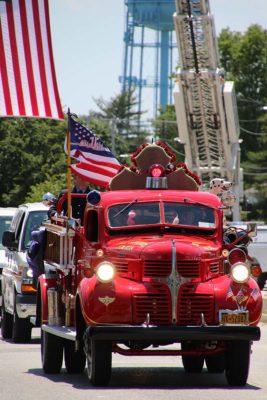
After the funeral Mass, Long Island Weekly spoke with John Feal of the Feal Good Foundation, whose aim is to help responders affected by 9/11 illnesses.
It was Feal who partnered Pfeifer with Stewart during the effort to extend the Zadroga legislation.
“I met Ray nine years ago, and felt an instant bond. Ray had an aura about him,” said Feal. “He made people gravitate towards him because of the way he lived his life, with dignity and class. You couldn’t help falling in love with Ray.”
Feal spent several hours with Pfeifer in his hospice room eight days before he died. Pfeifer was asleep at first, but when he woke up, Feal ordered dinner for his friend.
“He had beef stew,” Feal related. “He ate the whole thing. He ate it quick and he ate it all. And then he had two peanut butter cookies.”
They talked until Pfeifer’s sister Noreen came into the room and then said their goodbyes.
There was one final thing that Feal would do for Pfeifer.
“I gave him Jon Stewart’s phone number,” Feal. “He wanted me to ask Jon to give the eulogy, and I said, ‘No, Ray, here’s Jon’s number. You call him. I want you to do it.’ The most important thing he said to me that day was, ‘Don’t wait to do the bucket list. Don’t wait until the end.’ ”
In addition to getting an extension of the Zadroga Act, other items on Pfeifer’s bucket list included laying a wreath at Arlington Cemetery (which he and wife Caryn did this past spring) and sponsoring a FDNY Family Transport van (used to carry family members at funerals and other events). Feal’s Foundation and the Pfeifer family sponsored a fundraiser at Mulcahy’s in Wantagh. Stewart made a special appearance at this event.
The flier stated: “The FDNY Family Transport has been a lifesaver for Ray and his family. It has been Ray’s vision to provide a handicapped accessible van to the organization that would benefit other families in need.”
But Feal, wanting to make sure that Pfeifer saw something tangible as his illness worsened, went ahead and bought the van before the fundraising effort had been completed.
“To see his face when he saw the van…it was like a kid opening a present on Christmas morning,” related Feal.
The 9/11 survivors advocate saw his friend go from walking with a limp, to walking with a cane, to finally needing a motorized wheelchair, donated to the Feal Good Foundation by a widow of a firefighter who had died from 9/11-related brain cancer.
The foundation was part of the lobbying efforts, and Feal said he, Stewart, Pfeifer and their cohorts walked countless miles as they pounded the halls of Congress.
“And there was Ray asking, ‘What do you want me to do, John? Where do you want me to go?’ ” Feal said.
Pfeifer told his friend he was ready to face death, though he had put up a brave fight against the disease Feal labeled as “the devil.”
“He never complained. He never said, ‘Why me?’ He was always asking about someone else,” said Feal.
Feal got Sen. Kirsten Gillibrand to fly a flag over the capital the day after Pfeifer’s death. Then he had her office deliver it overnight so he could present it to the family.
“Ray didn’t invent patriotism, he perfected it,” Feal pronounced. “But I think it belittles Ray, because there’s not a word yet invented that best describes that man. He’s everything that’s great about this country, and everything that’s best about humanity.”
Asked what he thought Pfeifer’s legacy would be, Feal responded, “That he touched so many lives. Those who knew him? They were spoiled. And those who didn’t? They should be jealous, because they did not get to know him.”

